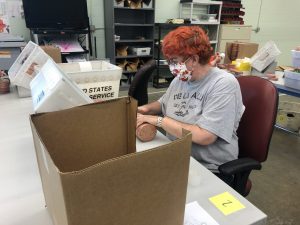Pandemic Causes Hardships for Workers with Developmental Disabilities
At a time when many recreation options are still on pause due to COVID-19, camping has risen in popularity.
“Camping is more popular than ever this year, so their business is booming, which is really good for us to provide more work opportunities,” said Bill Schultz, interim CEO of nonprofit Opportunity Partners.
At the organization’s Asplin Center in Plymouth, adults with intellectual developmental disabilities are benefiting from the camping craze.
“Yeah I like it,” said Laura Green, one of the people who come to Plymouth for work. On Tuesday, Green was one of dozens helping to put labels on discs that people use to start campfires.
“I love it,” Green said of the work.

Laura Green puts labels on fire discs at Opportunity Partners’ Asplin Center in Plymouth.
That joy is especially apparent, considering that for much of the pandemic, Opportunity Partners had to shut down this program, and others like it, to help limit the spread of the novel coronavirus.
“Initially when we closed down, it was our own decision,” Schultz said. “We wanted to keep people safe.”
When the organization thought about reopening, state officials decided it wasn’t the best idea.
“And the biggest reason was, they were having outbreaks in nursing homes and they were concerned about group home settings, and they have had some outbreaks there,” Schultz said. “So they really wanted to keep that to a minimum. It was a big driver.”
The decision had a two-pronged effect. Opportunity Partners took a big financial hit due to a loss of revenue it received from the state for providing services to people with disabilities. Those who rely on these services endured the mental toll of social isolation.
“Just being stuck at home,” Green said.
Allowed to Reopen in Mid-July
As of mid-July, the state allowed allowed Opportunity Partners and other day service programs for people with disabilities to reopen on a limited basis.
“What you’re seeing now is just a fraction,” Schultz said. “Traditionally, we have several hundred people who come into our programs, and currently we’re only able to offer to less than 200 people coming back.”
There’s no word on when they’ll be able to operate at their pre-coronavirus levels, but the plan is to work with the state Department of Human Services to let them know what they’re doing from a safety perspective, and hopefully get things back to normal at some point.
“We need to get people back engaged, back into the programs that we have to help support them and help build their skills,” Schultz said


